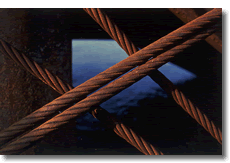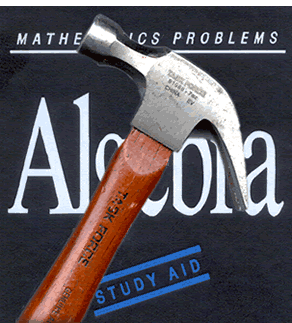|

Too Sandy the Foundation.
Tuesday, October 21, 2008
Fayetteville, Arkansas
This won’t be pretty, not smoothly done. I’m navigating choppy seas today, trying to get outta this place. Everywhere I look are shadows on the swells of the deep.
“If the devil fell away from God of his own free will, this proves firstly that evil was in the world before man, and therefore that man cannot be the sole author of it, and secondly that the devil already had a ‘mutilated’ soul...."
— Aion, Carl Jung, 1950
Among a universe of topics, why mass murder at schools? I won't admit to an obsession, though I do know violence, up close and personal. The other side of it — peace — is dear to me. Late in the passage, teaching high school kids, I saw again the precious nature of youth, uncorrupted — the innocent ones, yet clinging to the dream.
Ten Dead in Finland School Shooting
Second Bloodbath
in as Many Years
Prompts Examination
of Nation's Gun Laws
The Journal in Edinburg, Scotland
Nine students and a lecturer are dead following a multiple shooting at a vocational college in Finland which has reopened the debate on the widespread ownership of firearms in the country.
Just before 11 a.m. local time on Tuesday 23 September, second year culinary arts student Matti Juhani Saari entered the Kauhajoki School of Hospitality wearing a ski mask and carrying a large bag holding a .22 calibre handgun and several petrol bombs.
After opening fire on a group of students sitting for an exam, killing nine and one teacher, Saari set fire to the school building. The gunman also shot at emergency services and police as they attended the scene.
Twenty-two year old Saari later died in hospital due to a self-inflicted gunshot wound to the head.
Murder and Mayhem
Set Against Hope and Innocence
Again, the question: Among a universe of topics, why mass murder at schools?
Multiple murders and mayhem perpetrated by a solitary gunman become a set-piece of individual horror and societal madness, occurring and reoccurring often enough to develop into genres of human destructiveness, which are identified primarily by venue: the church sanctuary, the shopping mall, the workplace, the school campus.
What, then, makes god’s house, labor’s house, and the storehouse different from the school house? Dead is dead, say you not?
Hope and innocence come to mind — but only if we can agree that these paired states of mind and psychic development are descriptive of society’s youth, the children and adolescents and emerging adults, who spend half their days at school, K through 12, on an escalating treadmill.
Are the young more imbued with the bright light of hope? If so, what damage to hope doeth acts of multiple murder in the classrooms of the land?
Is not church the more appropriate repository for hope? And what about innocence? Isn’t it broken down daily on the rock-strewn path to experience?
Most Cold and Most Cruel.
Every argument becomes shaky under constant scrutiny and reappraisal. "The foundations are too sandy," John Keats wrote about the space of life between the boy and the man.
Nonetheless, the cold cruel world seems most cold and most cruel when it intrudes violently on the sanctity of school.
And why? And who is to blame? And what can be done?
When I began, two essays ago, to search for answers to the many questions raised by persistent outbreaks of malignant violence in schools, I called upon the cyber community of CornDancer and Crow’s Cottage to contribute to the search. Together we crafted two collective meditations on a most distressing and tragic issue. Here are links to the essays:

Bang Bang. Save a Life Today.

They Disappear. Love and the Destroyer.
I hope — there it is again, that emotive word, the one thing that didn’t escape from Pandora’s box, the emotion, Alexander Pope told us, that “springs eternal in the human breast" .... I hope our continuing commentary will do more than remind us of the tragedy and despair so prevalent in the human condition. I’m not presumptuous enough to suppose a cure. Give me the balm to soothe the pain. Give me the action plan to mitigate the damage.
Community and Tradition —
and a Set of Rules to Live by.
My friend Tony Foster, son of a farmer, teaches high school science in the community that raised him. The community is backwoods rural in the finest traditions of the concept, not very wealthy in the material sense of things, and very much committed to the values of family and faith.
Tony’s school survived a recent attempt by social deconstructionists and political opportunists from the capital city to shut it down. The big boys thought it was too small, this cohesive and nurturing school. They wanted to merge it with another small-town school, and make it big and cost-effective, impersonal and dissolute, like the failed schools in the inner cities, like the consolidated rural behemoths of diminished identity and corporate purpose, the schools with many course offerings and many more problems.
Tony writes:
The question was posed, “What do you think has led to this recurrent outbreak of school violence?” .... Which to me begs the question, Is it a new outbreak? Or do today’s media propagate the news of such events better now than in the past, causing our collective consciousness to be more aware of school violence. Do we erroneously perceive it as a greater problem now than in the past?
For now, let us assume that school violence is greater now than before. We then must seek out a cause, to make a case for blame, to instill the mission and vision for a cure.
We must consider the fact that today, compared to decades ago, more students are being forced to attend school longer, and that the curriculum resembles less and less of what the majority of our kids need and want.
Reality check: All students are not equipped to be successful in college. Whether they are lacking in intellect or motivation, some just won’t do well. If you believe otherwise, then you are optimistically naïve and have not spent a semester trying to teach high school level material to a truly representative group of teenagers. You are also guilty of propagating an elitist view that the only noble, satisfying pursuit is the quest for academic success.
Is it possible to be happy, productive, useful, wealthy, and loved without a degree? Absolutely.
A few years back I heard a report that the career with the highest job satisfaction rating was in the career of demolition. «sarcasm_on» What? Not aeronautics? Not medicine? Not human resources, philosophy, mathematics, literature, history? Why didn’t I major in Knocking Stuff Down or Blowing Stuff Up? «/sarcasm_off»
I know students who love to work concrete, or weld, or do body work on cars, or raise cattle. Without doubt, these are
 all honorable, necessary, respectable professions that do not require degrees in higher education. Some of these students are incensed by the prospect of sitting in a chair for six hours, listening to lectures, reading literature, and answering questions. Yet American society says they must endure the torture. (America, torture ... opens up a whole new thread of “why,” doesn’t it!)
all honorable, necessary, respectable professions that do not require degrees in higher education. Some of these students are incensed by the prospect of sitting in a chair for six hours, listening to lectures, reading literature, and answering questions. Yet American society says they must endure the torture. (America, torture ... opens up a whole new thread of “why,” doesn’t it!)
Why do we make all kids prepare for college, knowing the majority either don’t have the desire or the intellect to be successful in higher education, while neglecting the things that will be crucial to their success in business and industry?
One-size-fits-all education becomes mediocre at best. Specialization should happen before the master’s level. Our health care workers would be better healers and our craftsmen would be better builders — and the burger flippers are probably doing fine as they are.
Who doesn’t enjoy and appreciate the results of building something with their hands?
In education we force all high schoolers to sit and listen to the nuances of quantum physics, the electromagnetic spectrum, and the need to chase a big white whale. Some of them love and enjoy these things, but others loathe and abhor them. Shouldn’t we teach students within their skill sets and interests?
 Aren’t we wasting some of their potential talents in landscaping, brickwork, or automotive mechanics? Worse than suffering them through it all is the implication that all occupations not requiring higher education are less important, less worthwhile, low class. It’s an implication symbolized by the incessant focus on college preparation. I have yet to see an effective way to push those suited for higher education to their highest potential while simultaneously pulling along those who are not suited for it.
Aren’t we wasting some of their potential talents in landscaping, brickwork, or automotive mechanics? Worse than suffering them through it all is the implication that all occupations not requiring higher education are less important, less worthwhile, low class. It’s an implication symbolized by the incessant focus on college preparation. I have yet to see an effective way to push those suited for higher education to their highest potential while simultaneously pulling along those who are not suited for it.
I’m not saying leave them behind. Just put them on a different bus.
What’s the cause of school violence? Could be the act of systematically lowering the self-esteem of those who don’t fit the mold of the model student, while settling for underachievement in those that do?
Or, the influences of media — TV, movies, and especially violent, realistic video games — have the psychological effect of training away the innate aversion to killing another human that exists in most people.
Additionally, diminishing parental supervision and a general lack of effective parenting are pervasive in society. Parents who are often absent or overly eager to be “best friends” with their children aren’t guiding today’s youth into good decision making.
We very much want our children to have it better
 than we did, but we should be careful to not deliver this goal through an entitlement-ish attitude. We should use our improved socioeconomic status, if that’s the case, as an opportunity for success through education (knowledge) and skill development (hard work), not as silver-spoon handouts.
than we did, but we should be careful to not deliver this goal through an entitlement-ish attitude. We should use our improved socioeconomic status, if that’s the case, as an opportunity for success through education (knowledge) and skill development (hard work), not as silver-spoon handouts.
The need to “keep up with the Joneses” is often instilled, regardless of financial security. Every day I see kids from impoverished families with the latest cell phones, iPods, and designer jeans. “We want what we want and we want it now” is the attitude. “Me, me, me” as taught to children by parents really gets in the way of the cooperation and understanding that should, in the spirit of harmony, exist between students in different cliques.
Why the outbreak in school violence? Could be today’s self-raised, recklessly-empowered kids are better trained, better organized, less forgiving, and well tooled for revenge on the same ignorant bullies in the absence of proper parenting?
I am a teacher and a parent. My 13-year-old daughter does not have a cell phone, an e-mail account, a chatroom to frequent, a bare-midriff or expensive clothes, and she doesn’t watch R-rated movies, prime-time TV, MTV or South Park. She does make good grades, participate in sports, play a musical instrument, listen to a variety of musical styles without objectionable lyrics, read incessantly, have friends, and show kindness and respect to others, including my wife and me.
I won’t tell you that she’ll never roll her eyes at her teacher, but she knows what she’ll get if she does.
I do tell her that I’m proud of her and that I love her. I challenge her in some way on a daily basis. I see her frustration with the process, and see her delight in the outcome of success through effort. I expect her to do the best she can in school — turns out she is suited for it. If she wasn’t, I would encourage her in an avenue that would allow her to generate a living while still contributing something positive to her community.
I help her find endeavors that will flesh out and build her strengths and strengthen her weaknesses.
Kids blame kids, Americans blame foreigners, the world blames America, God blames the world, and the world blames God. Teachers blame parents and parents blame teachers. Parent, teacher: I am both, and in most cases, blame both. I also do both, parent and teach, all the time — to my kid, and possibly yours. What do you do?
Love Makes Sense to Me.
Let the language reflect the realities of the argument.Some of us need a call to action, but when would we find the time? Many of us are very much engaged in dodging the slings and arrows of daily life.
Those of us who work with young students, or children and grandchildren of our own, can always do better. We can be less aggressive and more loving in thought, word, and deed.
Shout it loud and proud from the highest hill:
Love is the answer
Transforming those four words into acts of kindness and compassion is another matter entirely, one best set into motion by the primal will to good, which emerges, naturally, from the center of the human spirit.
N E X T T I M E : Recent high school graduate Sara Boyer raises issues of safety and security on campus and how they sometimes clash with ideals of freedom and liberty. Philosopher Joseph Witt looks into the heart of darkness of the “shooter” in his reflection on the tensions and animosities of university-level academia, which can push students to the edge of a dangerous existential precipice.
|




